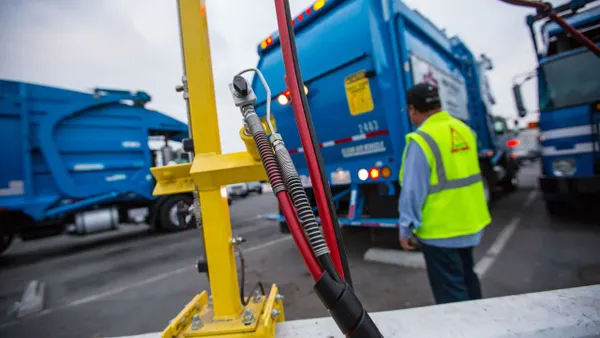Few policies have such far-reaching implications for how a state interacts with waste as California's SB 1383.
The law represents a daunting challenge for the industry, but also an opportunity for infrastructure expansion and innovation as it targets waste in the name of combating global warming. Successful implementation of SB 1383 could also serve as a model for climate-conscious governments scrutinizing their own approaches to waste.
"If we handle organic material differently, we're going to reduce climate change," said Christina Files, a public information officer with the California Department of Resources Recycling and Recovery (CalRecycle), in an interview with Waste Dive.
Also known as the Short-Lived Climate Pollutant (SLCP) Reduction Strategy, SB 1383 is part of an effort to meet the state's sweeping climate goals. In order to do that, California will need to reign in methane — a heat-trapping gas 80 times more potent than carbon over an initial 20-year span.
According to the U.S. EPA, MSW landfills are the third-biggest source of human-related methane emissions nationwide. MSW undergoes an initial aerobic process upon entering a landfill before transitioning to an anaerobic process where methane-producing bacteria decompose waste. The resulting landfill gas has drawn increasing scrutiny from regulators and environmental advocates.
SB 1383 establishes a 50% statewide reduction target for organic waste by 2020, using 2014 levels as a standard. By 2025, the state aims for a 75% reduction target. That end date is also the point by which CalRecycle has an additional target of diverting no less than 20% of edible waste for further human consumption.
"[Our] first target is to divert our organic waste to residential collection and edible food waste recovery," explained Files. She noted that each jurisdiction in California will be able to establish its own collection system, catering to the needs of those communities. Several jurisdictions already have active residential organics collection, and SB 1383 leaves room for a range of approaches to meet the state's goals.
Composting industry leaders have expressed enthusiasm about the law. Neil Edgar, director of the California Composting Council, told Waste Dive that his organization has been "heavily invested" in SB 1383 since it first began as a concept. He explained that the law poses big challenges, as well as key opportunities.
"For the waste industry, it's going to take a significant investment in infrastructure development," Edgar said, arguing that implementing the law will require "a number of new facilities...[and] a lot of new technologies."
According to a CalRecycle survey assessing needs in light of the SB 1383 regulations, the state's annual organics processing capacity will have to expand significantly to take in a total of between 12 million and 14 million tons. And to pave the way for expanded infrastructure, jurisdictions will also need to invest in other preliminary efforts, including reducing feedstock contamination and prioritizing processing contracts.
Those changes may not be spread evenly across the state. Edgar cited coastal areas in Northern California as spots where organic diversion strategies have been implemented, with some infrastructure already in place. In Southern California, however, he indicated that there might be "some price shock" throughout the industry and in communities.
Numerous investments in pre-processing equipment, composting, anaerobic digestion and other models are underway, with more expected in the years ahead.
"We're looking at about 30 to 100 new facilities depending on the size of the facility," said Lance Klug, another public information officer with CalRecycle.
SB 1383 will require "significant investment" across the industry, with buy-in from all stakeholders, but Klug said the costs must be viewed in light of other areas where expenses will decrease. "We estimate about $4.8 billion in savings and health care costs," he said.
CalRecycle estimates the law will moreover directly create some 12,000 "green" jobs, without even accounting for positions created indirectly.
Other states are watching California's efforts closely, with a few governments taking similar steps towards waste diversion. "I can say that we do know that there are other states that are doing [similar things]," said Files. New York, Massachusetts, Oregon, and Vermont are among the states currently taking the most aggressive approach to addressing organic waste.
But officials asserted that SB 1383 is special because of its emphasis on methane emissions. Above all, California is looking to the future at a time when concerns about climate change are mounting rapidly around the world, Klug said.
"Given our current climate, the climate crisis, the growing demand for things like carbon-neutral energy...[there are] just all types of benefits," he said.


 Read more
Read more






